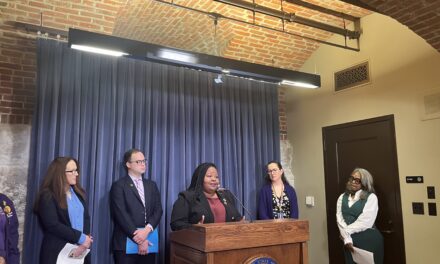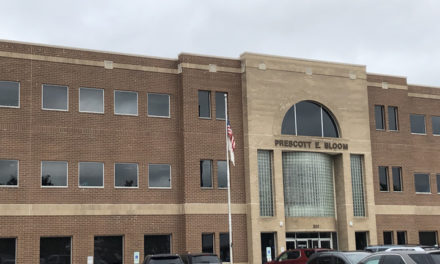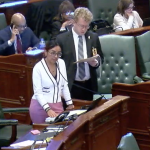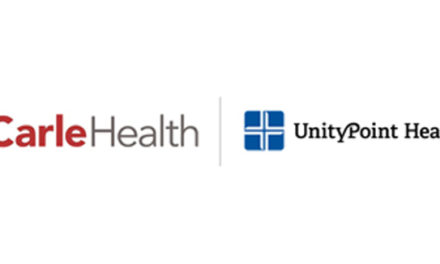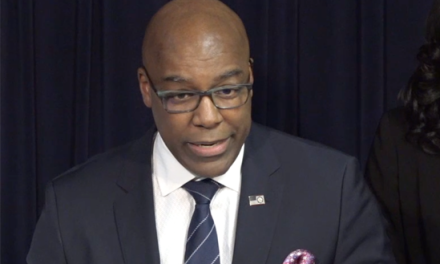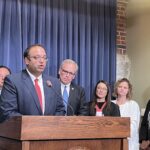
Chicago Abortion Fund’s Megan Jeyifo on preparations ahead of expected overturn of Roe v. Wade
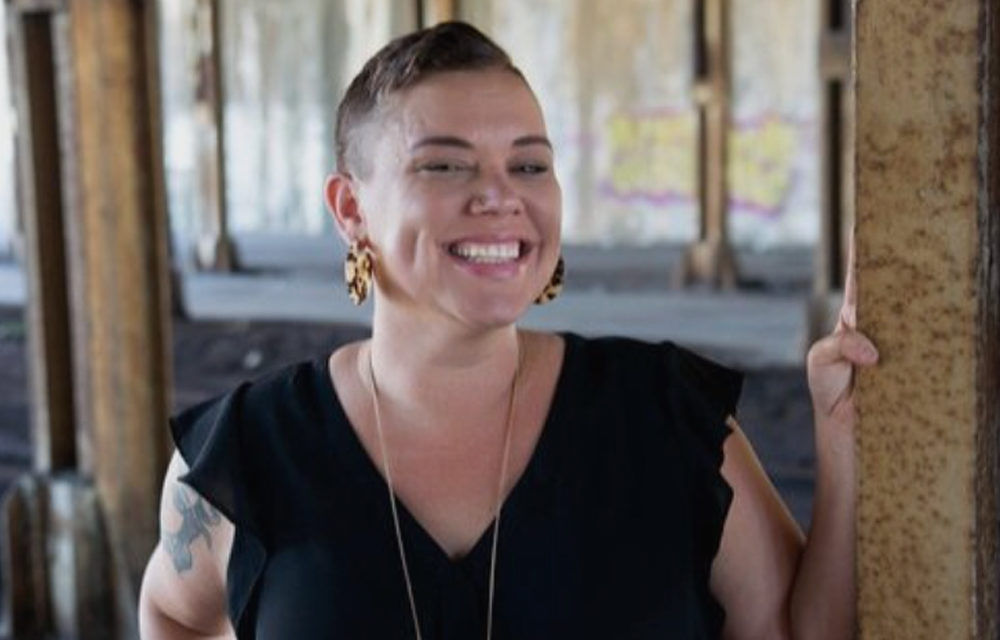
With the U.S. Supreme Court expected as early as this month to overturn Roe v. Wade, Democratic officials have repeatedly said Illinois will become an “oasis” for abortion services in the midwest.
With some estimates that Illinois may see tens of thousands of additional out-of-state individuals per year seeking services, abortion groups have worked to staff up and prepare themselves for the influx of patients.
At the Chicago Abortion Fund, which provides financial, logistical and emotional support for those seeking abortion care, Executive Director Megan Jeyifo said they have already seen demand nearly match what they saw all of last year. And that will likely grow post-Roe.
“I remain hopeful that we can continue to support all people, but we are going to need our entire community, our state, our region to step up and support, not just the Chicago Abortion Fund, but our sibling abortion funds around the region with whom we work very close to get their residents into our state,” she recently told Health News Illinois.
Jeyifo also spoke about policies to expand access to care in Illinois and whether there will be enough providers in the state to support the rise in out-of-state individuals seeking services.
Edited excerpts are below.
HNI: what is the current mood right now like?
MJ: I think the (Supreme Court draft) leak provided a very interesting window into what kind of reaction we can expect from the American public. And the vast majority of people in this country do believe that Roe should remain in place and that folks should be able to access abortion. All polling shows that it’s very, very clear, and as devastated as I am about what we believe to be the outcome that Roe will be overturned, it has been good to see people vocal and loud and upfront about support for abortion access and actually saying the word abortion and not using euphemisms, like a right to choose or women’s healthcare and specifically saying ‘we need to protect abortion.’ And here in Illinois, we are a state that has protected access. And I’m really interested in how Illinoisans and our elected officials can move from a state of protected access to a state of expanded access at this moment.
HNI What do you think of when you talk about expanded access?
MJ: California is a really good example of a state that is taking the expansion of abortion access very seriously. They have created a California Future of Abortion Council, and they have different pieces in progress legislatively and the budget and administratively to improve access to abortion in that state. Not just for Californians, but for the thousands of people they know are going to be traveling to California. And that’s a very similar space that Illinois finds itself in where the Chicago Abortion Fund supports hundreds of people every single month coming into Illinois with Roe in place. And this is obviously going to increase so much more this summer. One of the biggest things that we at the Chicago Abortion Fund would like to see is the elimination of cost-sharing for abortion and abortion-related services, regardless of insurance. So in Illinois, Medicaid covers abortion care at no charge for people who are Medicaid holders or, in some instances, people who are presumed eligible for Medicaid through Medicaid presumptive eligibility. But if you are a private insurance holder here in Illinois, many times your insurance doesn’t cover your abortion, or you have a very high deductible or high copay and it basically renders the insurance useless. And because federal insurance still needs to abide by the Hyde Amendment, that leaves a lot of people left out of the Medicaid coverage here in Illinois. So if you’re a joint Medicare-Medicaid holder, you are not able to access care without paying for it. If you have military insurance, for instance, we hear from people in the military who cannot use their federal health insurance for abortion here.
And so we really want to see a $0 copay and no cost-sharing for abortion and abortion-related services here in Illinois. And I think there’s other pieces that we’d like to see. We want to see a more robust effort against crisis pregnancy centers. These centers do a very good job at misleading – I don’t know if misleading is the word – lying to people. And we’re very concerned that people traveling into Illinois to access care are going to be tripped up in this crisis pregnancy center cycle and end up going to one of them instead of an actual clinic. And that would be very harmful for someone who’s making an effort to get to the state, spending their money, taking time off of work, figuring out what to do with their children, it’s already hard enough to access a real abortion. If you end up at a fake clinic, that can just cause you to delay even longer.
HNI: How is the organization preparing for the likely overturn of Roe v. Wade?
MJ: We are staffing up right now. We’re currently hiring for a couple of positions. The majority of those positions are to do patient navigation. We call them support coordinators, so those are people who are on our hotline every day, helping people get from point A to B, helping them figure out what clinic to go to, doing emotional support, figuring out the childcare, figuring out the best options for them. We’re also in the process of beginning a new volunteer cohort. So we doubled our volunteers in January in preparation for this moment, we doubled our volunteer case managers in January, and now we are going to go back out and do another cohort. Usually, we only do one a year because we do have a very intensive training process, and it does take quite a bit of time. But given what we know is coming, we are going to go ahead and do another cohort of volunteers this year. And then we’re also fundraising. We are trying to talk to whomever we can talk to to make people understand that the Chicago Abortion Fund has been supporting people living in a post-Roe reality for a very long time.
HNI: Are there concerns that there will be enough providers in Illinois to handle this expected influx of patients from other states?
MJ: I think providers, similar to us, have seen the writing on the wall for quite some time and so they are also ramping up their capacity very aggressively. We’ve been able to deepen our partnerships with providers around the state. There are some new clinics opening and there are new doctors coming into the state. There are clinics that are expanding the days that they do procedures, for instance. So I think Illinois providers know how high the stakes are, they recognize the mandate that Illinois has. And our providers in the state are incredible people and I know that they are going to do whatever they can to continue to support people coming into our state for care.
HNI: Is the fund’s workforce currently there to address the expected demand for service?
MJ: We at the Chicago Abortion Fund have had a great interest in all of the positions we are hiring for. We believe we have created a very, very good place to work. We are doing very difficult work. We’re doing work and experiencing secondary trauma and vicarious trauma. It is hard now, and we know it is going to get worse. So we really try to create conditions where our staff can feel supported and cared for, and that’s not always easy with what we’re up against. We have not had a workforce issue at our organization.
HNI: How much additional demand for services are you expecting post-Roe?
MJ: So in 2018, we supported less than 200 people, and in 2021 we supported over 3,000. So that was a significant increase in just three years. I haven’t looked at our May numbers…but so far we have heard from probably close to 2,500 people already this year. When I last looked, it was around 2,000, and we’re averaging 500 calls a month. So I mean it is a tremendous need. There are some days where we’ll have 60 calls in one day, it’s just a very, very hard time already. And then there are estimates of how many people will be coming into Illinois, and what kind of needs that they’ll have – and there’s such a wide range because we also don’t know in what order states will go dark. It is difficult to plan for. CAF since July of 2019 has not had to turn anyone away for any reason, for any funding reason. And so I remain hopeful that we can continue to support all people. But we are going to need our entire community, our state, our region to step up and support, not just the Chicago Abortion Fund, but our sibling abortion funds around the region with whom we work very close to get their residents into our state. And so abortion funds have a very strong network, we are a constellation, we are constantly in communication with each other and all of us are working really hard to do whatever it takes so that we don’t have to start turning people away.
HNI: How do you connect with individuals from out-of-state about what services are available in Illinois?
MJ: So we currently work with between 50 and 60 clinics across seven states. So we don’t just support people in Illinois, we also have relationships with clinics outside of Illinois. And many of those clinics we know will continue to figure out how to support people and direct people to where they need to go if their clinic or their state becomes a space where they can no longer access care. So deepening those partnerships is really important…We need to make sure that we’re having conversations about abortion access, in our community, at our dinner table, at our places of worship, and be very clear that we inform ourselves so that we can be a resource for people seeking abortion care because what they are going to find on their own is oftentimes not going to be accurate.
HNI: Are there enough funds available for this expected surge in service?
MJ: I think funding for abortion and funding for people coming into this state is really important. We saw the city take some action on that with $500,000 they’ve pledged to support abortion seekers, but that that is not going to last very long, it’s really clear. We need deep investment at all levels of government in helping people get care when they come to Illinois.

